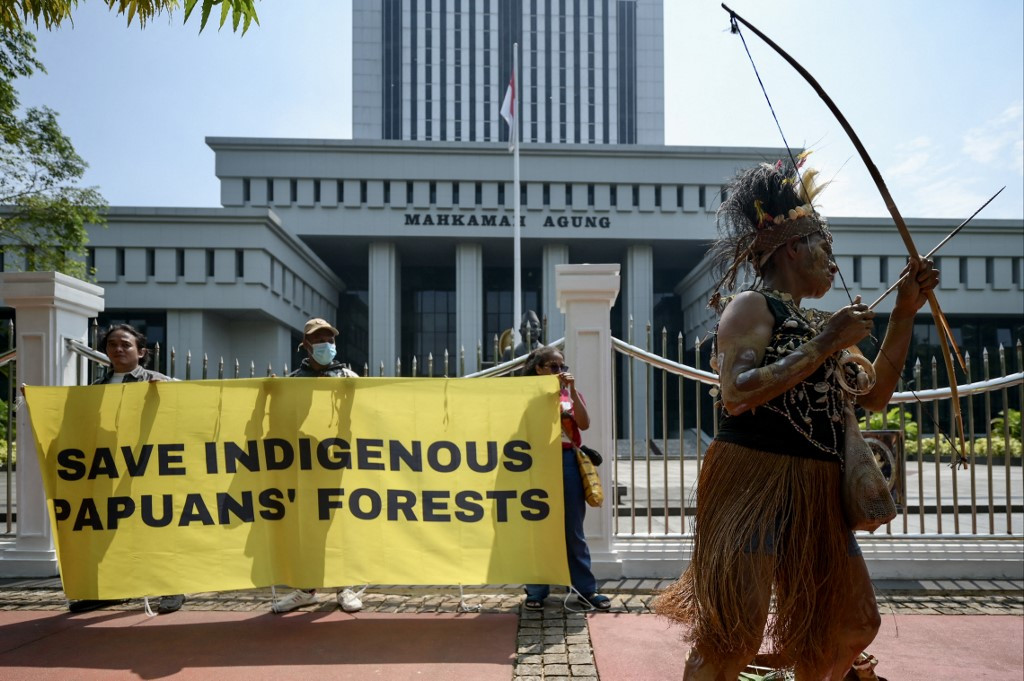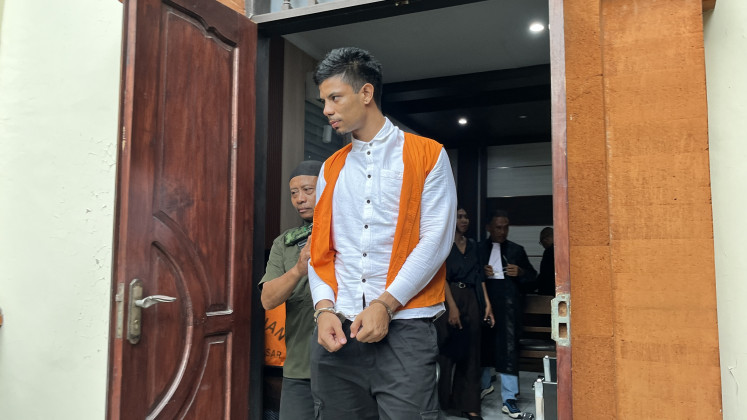Popular Reads
Top Results
Can't find what you're looking for?
View all search resultsPopular Reads
Top Results
Can't find what you're looking for?
View all search resultsPapua tribe’s homeland at risk after losing court battle
In a two-to-one decision, the bench ruled that the appeal exceeded legal time constraints, with the dissenting justice argued that IAL's permit violated Indonesia's environmental rules.
Change text size
Gift Premium Articles
to Anyone
 Representatives of the Awyu and Moi indigenous communities protest in front of the Supreme Court building in Jakarta on May 27, 2024. They were calling for the country’s highest court to revoke the permits of palm oil companies that are set to operate in Papua, which could potentially clear approximately 300 square kilometers of customary forest. (AFP/Bay Ismoyo)
Representatives of the Awyu and Moi indigenous communities protest in front of the Supreme Court building in Jakarta on May 27, 2024. They were calling for the country’s highest court to revoke the permits of palm oil companies that are set to operate in Papua, which could potentially clear approximately 300 square kilometers of customary forest. (AFP/Bay Ismoyo)
T
he Supreme Court rejected on Friday an appeal by an indigenous tribe in Papua in its lawsuit against a palm oil firm, a decision a rights group said put the tribe at risk of losing vast swaths of ancestral forest.
The Awyu tribe, whose roughly 20,000 members rely on the land for their subsistence, had sought to suspend the operations of private palm oil company PT Indo Asiana Lestari in West Papua.
But the Supreme Court rejected their final appeal, according to a document published on its website on Friday, upholding the company's 36,000-hectare government concession, more than half the size of Jakarta.
In a two-to-one decision, the bench ruled that the appeal exceeded legal time constraints. The dissenting justice argued that IAL's permit violated Indonesia's environmental rules.
"I feel heartbroken because I am left with no other legal avenue to protect the land and the people of my ancestral homeland," said Awyu tribe plaintiff Hendrikus Woro.
"I am shattered because throughout this struggle, there has been no support from the government, local or central. Who am I supposed to turn to, and where should I go now?" he said in a statement released by the Coalition to Save Papuan Customary Forests, made up of 10 environmental NGOs.
A Supreme Court spokesperson declined to comment when contacted by AFP about the ruling.
The Awyu tribe's case drew attention in Indonesia earlier this year after a campaign called “All Eyes on Papua” spread on social media.
"Both the government and the legal system have failed to stand with indigenous peoples," said Sekar Banjaran Aji of the Save Papuan Customary Forest advocacy team.
"The struggle to protect Papua's customary forests has become all the more challenging."
In November, a Papuan court had ruled that PT Indo Asiana Lestari's permit was valid, rejecting the Awyu tribe's argument that the concession had been granted based on a flawed environmental impact assessment.
The tribe and environmental NGOs also claim opponents of the palm oil firm's plans have faced intimidation.
Aside from this case, other Awyu members are also seeking to revoke the permits of PT Kartika Cipta Pratama and PT Megakarya Jaya Raya, two other palm oil companies granted concessions in the same area. The total size of the area for all cases is nearly 115,000 hectares.
Environmental groups supporting Awyu’s cause said the Supreme Court's rejection on Friday could have an impact on the results of the other cases.
Indonesia produces about 60 percent of the world’s palm oil, with one third consumed domestically.
Papua lost 2.5 percent of its tree cover between 2001 and 2023, according to Global Forest Watch.









